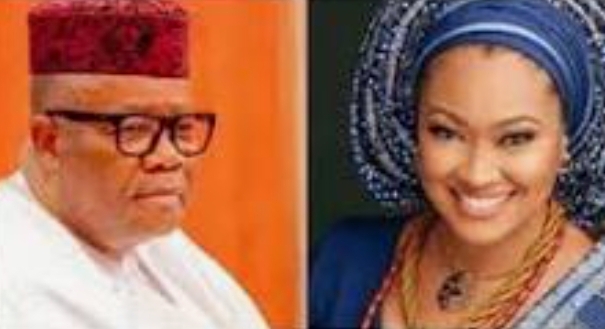Senator Natasha Akpoti-Uduaghan accused Senate President Godswill Akpabio of sexual harassment, which he denies. After raising her claims in the Senate and at the Inter-Parliamentary Union (IPU), she was suspended for six months, allegedly for violating Senate rules. The IPU is investigating, while she has taken legal action, insisting her suspension was meant to silence her.
Natasha vs Akpabio: Nigerian Senate ‘sexual harassment’ scandal escalates


The controversy surrounding Nigerian Senator Natasha Akpoti-Uduaghan's allegations of sexual harassment against Senate President Godswill Akpabio has intensified, reaching new heights with her decision to escalate the issue to the Inter-Parliamentary Union (IPU) in New York on Tuesday.
At the core of the dispute is Akpoti-Uduaghan's claim that Akpabio sexually harassed her during a visit to the Senate President’s residence in December 2023, where she was accompanied by her husband. Akpabio has vehemently denied the allegations, asserting that he has always "upheld respect for women" and describing the accusations as "traumatizing" for both himself and the Senate. The allegations have led to widespread calls for his resignation.
Despite the seriousness of Akpoti-Uduaghan's claims, the Senate suspended her for six months without conducting an investigation into the matter, sparking public outrage and raising concerns about due process and gender rights in Nigeria’s legislative body.
Akpoti-Uduaghan, who represents Kogi Central, initially made her allegations during a live television interview following a dispute over seating arrangements in the Senate chamber. She later formalized her claims during a Senate session by filing a petition. However, the Senate contends that her suspension was not related to the harassment allegations but was due to her violation of Senate rules.
Addressing the Women in Parliament session at the IPU, a global body representing national parliaments, Akpoti-Uduaghan expressed her frustration and sought international support. "I was suspended illegally because I submitted a petition for sexual harassment against the President of the Nigerian Senate, Senator Godswill Akpabio. I thought that by submitting the petition, he would recuse himself, and both of us would submit ourselves to the Committee on Ethics, Privileges, and Public Petition for a fair, transparent investigation. But unfortunately, I was silenced, and I was suspended," she told the IPU gathering.
Akpabio has continued to deny the accusations, reiterating during a Senate session, "At no time did I ever harass any woman. I was raised very well by my late single mother, and I have always upheld respect for women." Meanwhile, the Senate has maintained that Akpoti-Uduaghan’s suspension stemmed from her refusal to comply with new seating arrangements within the chamber, rather than her harassment claims.
Senate Majority Leader Michael Opeyemi Bamidele defended the decision, explaining to TRT Afrika, "Distinguished Senator Natasha Akpoti-Uduaghan was suspended by the Senate for reasons of flagrant violation of the rules of the Senate. One of the rules of the Senate, Rule 6, has to do with the discretion and the authority of the President of the Senate to allocate seats."
Bamidele elaborated that the seating changes were necessary to accommodate shifts in the chamber following the defection of two opposition senators to the ruling All Progressives Congress (APC). As a result, Akpoti-Uduaghan was reassigned a different seat. He emphasized that she was not the first senator to be relocated within the chamber and insisted that her defiance of the seating arrangement, rather than the harassment allegations, led to her suspension.
Regarding the sexual harassment claims, Bamidele stated that the Senate was unable to investigate because a case had already been filed in court. "If a matter is before the Senate, there is separation of powers. If a matter is before the judiciary, the legislature cannot take it over. So, what are we going to be investigating?" he questioned.
Despite the suspension, there is a possibility that it could be lifted. "There are two options. One option is serving the suspension for six months. The other option is the path of reconciliation. If she feels she has done anything wrong and wants to apologize to the institution, there's always that option," Bamidele noted.
Akpoti-Uduaghan, however, remains resolute in her stance, arguing that she was deliberately targeted to silence her. She has taken legal action against Senate President Akpabio, challenging what she describes as her "illegal" suspension in a Nigerian court.
Meanwhile, the Inter-Parliamentary Union, where she raised her complaints, has pledged to investigate the matter further. However, IPU President Tulia Ackson clarified that they would need to hear Akpabio’s side before taking any steps. "Because we listened only to her side, as an institution, as IPU, we will be taking the concerns that have been raised—not only taking her side, but also giving a chance to listen to the other side, as it is a custom for IPU. And after having listened to the other side, we will take steps as necessary," Ackson said.
In response, a spokesperson for Akpabio dismissed the relevance of the IPU’s involvement, stating that the international body has no authority to summon the Nigerian Senate President over the matter.
Additionally, the Nigerian Senate has formally responded to Akpoti-Uduaghan’s claims at the IPU through a letter penned by Senate Majority Leader Bamidele Opeyemi. The letter asserts, "Senator Natasha-Akpoti-Uduaghan was suspended for gross misconduct and unruly behavior and not as a result of allegations of sexual harassment or assault… Let it be unequivocally stated that Uduaghan was suspended solely for her persistent act of misconduct and disregard for the Senate Standing Orders."
As the situation continues to unfold, the case has drawn significant attention both within Nigeria and internationally, highlighting broader issues of gender rights, legislative ethics, and political power dynamics in the country’s governance.

 বাংলা
বাংলা  Spanish
Spanish  Arabic
Arabic  French
French  Chinese
Chinese 
